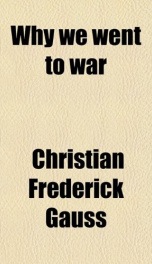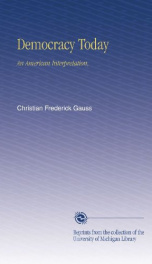why we went to war

Purchase of this book includes free trial access to www.million-books.com where you can read more than a million books for free. This is an OCR edition with typos. Excerpt from book: CHAPTER III THE OCCASION OF THE WORLD WAR TN 1914 Europe was in a state of tension which had lasted six years, and which was beginning "to try the nerves" of the great Powers. More than anything else the movement in the Balkans was responsible for this general restlessness. The situation, especially in view of the increase of armaments in Germany, of which we have already spoken, and the French reply, by increasing the period of military service from two years to three, and the general aggressiveness of Berlin, made war seem imminent. The Balkan Peninsula had become the storm- centre, for, as we have seen, the developments there were threatening to overturn the unfortunate system of balance of power on which European politics had so long rested. Yet in the early stages of the recent war we were inclined to pay too much attention to what was happening in the Balkans primarily, andhave therefore seen the developments that led to the conflict somewhat out of focus. In July, 1914, the world was trying to look into the future through the passes of the Balkans. Events there which in ordinary times would have been of minor consequence loomed large and portentous. When a Bosnian, Ga- brilo Princep, who was an Austrian subject, assassinated the Austrian crown prince, Francis Ferdinand, and his wife, and war followed, it was natural under the circumstances and under the stress of the first shock to attribute the war to Princep's crime. Yet the assassination of the archduke was no more the cause of the war in any philosophical sense than the fly on the telescope is the cause of the great spot onx the sun. It was not the cause of the war, it was merely the occasion. The causes lay deeper as we have already seen. The war would have come in any case; Princep's crime merely made it certa...
Info about the book
Author:
Series:
Unknown
ISBN:
0802119921
Rating:
3.5/5 (2)Your rating:
0/5
Languge:
English
Users who have this book
Users who want this book
What readers are saying
What do you think? Write your own comment on this book!
write a commentGenre
if you like why we went to war try:
Other books by this author
Do you want to read a book that interests you? It’s EASY!
Create an account and send a request for reading to other users on the Webpage of the book!




